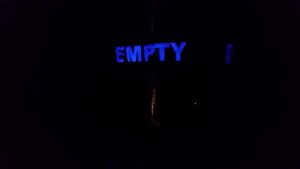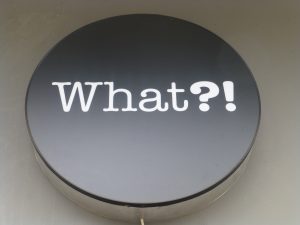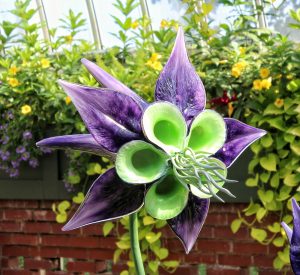
Violet Glass Was Originally Named Lillah Grey

As a protagonist name, Lillah Grey fit all the criteria—short, straightforward, but interesting and nicely thematic, with no problematic strings attached. That is, until 50 Shades of Grey became popular. That changed things. So Lillah’s last name had to change as well.

I’d chosen Grey originally due to being between light and dark. I wanted that ambiguity for the protagonist of Waxing Dark. A new name would need equivalent symbolism. I explored several options but my choice was clear.
Existential Glass

Glass implies translucence—a view that changes dependent on what is close to it. It also implies the quixotic question of “a glass half empty” or “a glass half full.” This fit the ambivalence of my protagonist’s character and the theme of the choices she must make.

Glass can also imply reflection. Paired with transparency, self reflection emerges.

Glass can be fragile, but also surprisingly strong. If it does break it can cut you.
As a name, “Glass” was better than “Grey.”
So, a bit miffed, but content with the change, I did a find/replace and set about re-training myself to call my protagonist by a different last name.
Name Pronunciation Problems
But when my significant other asked to read the trunked book, I discovered the second problem—a problem with the first name.
He kept referencing someone called “Lye-lah” when he talked about the book.

Lye-lah? Who’s Lye-lah? Oh. Oh no!
He was talking about Lillah. Lillah like Lilly. Two L’s make it a soft vowel, that’s basics from elementary school. But my significant other is very good at grammar—if he wasn’t reading it correctly then what about others? This was a potential catastrophe.
When I asked him about it he was adamant that many others would read it that way. In my gut I feared he was right.
The Necessity of Name Accord

You see, protagonist names are a bit different—you want your reader to lose themselves in being that character. They should be sucked in with as little friction as possible—if it fails at reader immersion, it fails as a name. Any uncertainty in a reader about how to pronounce that protagonist name is a bane.

As a writer, you definitely don’t want readers to be afraid to converse about the book because they know there’s ambiguity in how to pronounce the protagonist’s name. Name discord squelches word-of-mouth.
Reader Disagreement
Worse—what if readers chose Lye-lah or Lĭllah and just go with it? What if they become passionate about the book and talk to others about it? Normally that would be a good thing—but not if nomenclature arguments sour the conversation.

You don’t want arguments in your reader-base. The end goal is to have readers gushing to each other about how good the book was—not arguing over a name.

But that’s not even the worst of it.
That only comes if you get popular enough for an audio book. Then the “correct” pronunciation is set in stone, and half of your readers feel sincerely ashamed. You don’t ever want your readers to feel embarrassed for talking about your book, or betrayed by you as an author. Doing so will either stop them talking or change their tone.

As writers, we get attached to our character names—but it’s not worth that.
Name Survey Time

So I polled my co-workers with the pre-loaded decision that if reader interpretation was too split, “Lillah” had to go.
A Cacophony Of Responses

So what was the result of the survey?
- Lĭllah (Like Lilly)—5 Readers
- Līllah (Like Lye)—8 Readers
- Lēllah (Like Lee)—1 Reader
I also found two etymology websites that proclaimed it was Lĭllah (Like Lilly) and none that liked the Līllah (Like Lye) pronunciation, but this is not like a quiz in school—being “right” wins me nothing if more readers are in the other camp.
For that matter, I found a website that actually liked the Lēllah (Like Lee) pronunciation. Such chaos!

“Lillah” Had To Go
My significant other and I went out on the etymology sites—hunting. We were looking for something short and appealing. It needed to fit the themes, have good etymology, and not be too close to any existing character’s name. But the final test was if throngs of avid readers would read it the same way. So a lot of exotic, quixotic names I loved (many of which started with “Z”) were heartlessly eliminated.

Ram actually found the winner. Violet was short, attractive, had a dark thematic appeal, no weird etymology, and best of all readers would already know how to pronounce it. Common usage trumps all.

Violent Glass

Violet also sounds and reads a bit like “violent” which fits the character, and the mayhem she perpetrates, to a tee.
Violet Glass

Taken together, Violet Glass might be a bit too pretty—but for a YA audience, that’s not necessarily a bad thing. A bit of clever lampshading and we’re good to go. In the end, Violet Glass has a strong impact—crushing Lillah Grey. The more dynamic protagonist is the one that attracts more readers, and attracting readers is the goal. I’d rather have them in a choke hold till they’re done reading than choking on a name.




